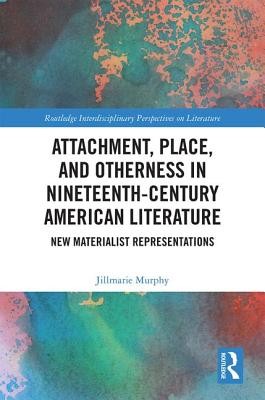
- We will send in 10–14 business days.
- Author: Jillmarie Murphy
- Publisher: Routledge
- ISBN-10: 1138673269
- ISBN-13: 9781138673267
- Format: 14 x 21.6 x 1.1 cm, kieti viršeliai
- Language: English
- SAVE -10% with code: EXTRA
Attachment, Place, and Otherness in Nineteenth-Century American Literature (e-book) (used book) | bookbook.eu
Reviews
Description
This interdisciplinary study examines the role interpersonal and place attachment bonds play in crafting a national identity in American literature. Although there have been numerous ecocritical studies of and psychoanalytic approaches to American literature, this study seeks to integrate the language of empirical science and the physical realities of place, while also investigating non-human agency and that which exists beyond the material realm. Murphy considers how writers in the early American Republic constructed modernity by restructuring representations of interpersonal and place attachments, which are subsequently reimagined, reconfigured, and sometimes even rejected by writers in the long nineteenth century. Within each narrative American perceptions of otherness are pathologized as a result of insecure human-to-human and human-to-place attachments, resulting in a restructuring of antiquated notions of difference. Throughout, Murphy argues that in order to understand fully the contextually varied framework of human bonding, it is important to emphasize America's attachment to various constructions of otherness. Historically, people of color, women, ethnic groups, and lower class citizens have been relegated--socially, politically, and culturally--to a place of subordination. Refugees escaping the French and Haitian Revolutions to American cities encouraged writers to transform social, cultural, and political attachments in ways that the American Revolution did not. The United States has always been part of an extended global network that provides fertile ground from which to imagine a future American identity; this book thus gestures toward future readers, educators, and scholars who seek to explore new fields and new approaches to understand the underlying human motivations that continually inspire the American imagination.
EXTRA 10 % discount with code: EXTRA
The promotion ends in 22d.01:08:10
The discount code is valid when purchasing from 10 €. Discounts do not stack.
- Author: Jillmarie Murphy
- Publisher: Routledge
- ISBN-10: 1138673269
- ISBN-13: 9781138673267
- Format: 14 x 21.6 x 1.1 cm, kieti viršeliai
- Language: English English
This interdisciplinary study examines the role interpersonal and place attachment bonds play in crafting a national identity in American literature. Although there have been numerous ecocritical studies of and psychoanalytic approaches to American literature, this study seeks to integrate the language of empirical science and the physical realities of place, while also investigating non-human agency and that which exists beyond the material realm. Murphy considers how writers in the early American Republic constructed modernity by restructuring representations of interpersonal and place attachments, which are subsequently reimagined, reconfigured, and sometimes even rejected by writers in the long nineteenth century. Within each narrative American perceptions of otherness are pathologized as a result of insecure human-to-human and human-to-place attachments, resulting in a restructuring of antiquated notions of difference. Throughout, Murphy argues that in order to understand fully the contextually varied framework of human bonding, it is important to emphasize America's attachment to various constructions of otherness. Historically, people of color, women, ethnic groups, and lower class citizens have been relegated--socially, politically, and culturally--to a place of subordination. Refugees escaping the French and Haitian Revolutions to American cities encouraged writers to transform social, cultural, and political attachments in ways that the American Revolution did not. The United States has always been part of an extended global network that provides fertile ground from which to imagine a future American identity; this book thus gestures toward future readers, educators, and scholars who seek to explore new fields and new approaches to understand the underlying human motivations that continually inspire the American imagination.


Reviews